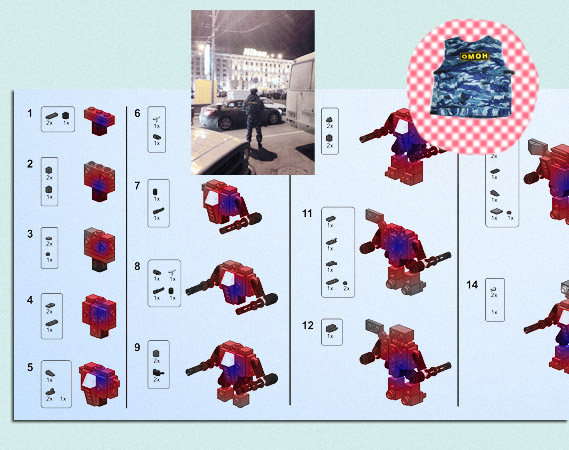Practical tips for protesters
Over the past two days in Moscow, about nine hundred people were detained. Because on Saturday another massive rally is planned (allowed number of participants is 300, but on Tuesday the amount of confirmations on the Facebook page 10, 000), the number of detainees in a week can rise above one thousand. Amnesty International considers all those detained during the rallies for Fair Elections as prisoners of conscience, but in Moscow police station, this won’t be much of a help. BG has prepared some brief instructions you can use in the event of detention. You should print them out and take them with you, going to any rally or gathering

1. What charges are likely to be produced against you.
All detained participants of the meeting on Chistye Prudy will face charges by article 19.3 of the Administrative Code, “Disobedience to the lawful order of a police officer, soldier, a member of a drugs enforcement agency, a member of the Federal Security Service, an employee of the bodies authorized to exercise functions control and supervision in the field of migration, an official of the agency or institution of the correctional system.” Paragraphs 1-3 of this article (disobedience to representatives of various law enforcement agencies in the performance of their duties), are punishable by either a fine of 500 to 1000 rubles, or detention for up to 15 days.
2. If you are, during detention, purposely hit by a police officer, this is a violation of your rights.
“A policeman is forbidden to resort to torture or to cruel or degrading treatment. A police officer is obliged to refrain from actions that intentionally inflict pain on citizens intentionally inflicted pain, whether physically or mentally” (paragraph 3 of article 5 of the Law “On Police .”)
3. If you are arrested by someone from the police, who refuses to give his name and title, this a violation of your rights.
“In addressing a citizen police officer is obliged to give their position, rank, name, at the request of a citizen to show an official identification, and then report the reason and purpose of treatment” (paragraph 4 of Article 5 of the Law “On Police.”)
4. If you are not given access to a lawyer, for instance on the grounds that you are not charged with criminal and administrative offense yet, this is a violation of your rights.
“Everyone arrested, detained and accused of having committed a crime shall have the right to counsel (a lawyer) from the moment of arrest, detention or charge” (part 2 of article 48 of the Constitution.)
5. If you are told that there is no one to write a complaint, or that it’s not allowed to do so, you are being lied to.
“A citizen has the right to appeal against actions (decisions) in violation of his rights and freedom, either directly to the court, or superior to ... public authority ... official, public official” (Article 4 of the Law “On appeal to the court actions and decisions violating the rights and freedoms of citizens .”)
6. Administrative detention can last no longer than three hours.
“The term of administrative detention should not exceed three hours”(paragraph 1 of article 27.5 of the Administrative Code.) The detention of more than three hours is possible only if the excitation of an administrative case. “A person against whom proceedings are being conducted on an administrative offense that entails as one of the measures of administrative punishment administrative detention may be subjected to administrative detention for a period of not more than 48 hours” (paragraph 3 of Article 27.7 of the Administrative Code.)
7. Relatives or friends can give you the essentials and food.
“These people (i.e., detained for more than three hours. - BG) also have the right to obtain essential items (hygiene kits) and food from relatives and other persons” (Article 4 of the “Regulations on conditions of detention of persons detained for administrative offense, food rations and medical care procedures such persons.”)
8. You have the right to call once and leave messages in social networks with family and friends.
The practices of recent days show that the police did not rob detainees of their phones, although often prohibited them to make calls referring to the law “On Police.” On March 1, 2011, this rule has lost its power. “A detained person, as soon as practicable, but not later than after three hours of detention, unless otherwise provided by the criminal procedural legislation of the Russian Federation, has the right to one phone call to notify relatives or close persons of their detention and whereabouts” (para. 7 of Part 2 of Article 14 of the Law “On Police.”)
See also instructions for survival at rallies, by journalist Olga Romanova:
Going to the rally, flashmob, gathering, meeting, regardless of whether allowed or not, the following:
1. Handkerchief linen. Paper handkerchiefs (2 pcs.), or wipes in a plastic bag. Wet wipes. Personal hygiene (girls).
2. Charged spare phone. Take phones that do not cost a lot. Make sure there’s r. 200-300 of credit.
3. You will need phone numbers, so store them in your phone, on your SIM card and write them down paper: relatives, friends, media, Embassy/Consulate if you are not carrying a Russian passport.
4. Take a backup SIM card with you, without pin code, but with phone numbers and at least 100 rubles of credit on it.
5. Bars of dark chocolate, candies (for sucking, not chewing), chewing gum, a pen, pencil, small sheets of paper.
6. Money in small denominations of 50-100 r. Not more than 1,000 r., some one-way metro cards.
7. Wear a jacket with no cords or ropes (not allowed in detention), shoes without laces, socks (and a spare pair), a hat (definitely!), gloves. Any scarf will be taken off you.
If you are detained:
8. Do not resist, relax your hands and lean on those that take you, keep your chin to your chest, cover your head with your hands.
9. If you are hit, scream, do not hesitate, as loudly as possible.
10. Once in the paddy wagon, immediately send an SMS. If you call, do it secretly, as your phones can taken away. If you take photos, store them on the memory card, preferably password protected.
11. Ask, (politely!) the titles, names, names of police officers you are dealing with. Do not cry, do not swear, do not threaten, be extremely polite and correct.
Questions to the law enforcers:
a) For what reason have I been apprehended/detained?
b) To whom do I look suspect (if the answer to the first question is – suspicious behavior)?
c) Your job title, full name, and ID number please (just write and SMS).
12. In the ward where you delivered, you will be placed in KAZ (the room of the administrative detainees), there they can keep you in detention up to three hours (counting from the moment you were sat down in the paddy wagon.)
13. You may have to hand in keys, phones, money. If you do, must compile a report. The protocol requires you (under the law), the time (hour and minute), details of who seized your possessions. Do not sign anything without reading it. In general, it's better not to sign anything at all, arguing that the detention and maintenance in your KAZ is illegal.
14. You must give an explanation of what happened and why you did something. Whatever you give as a reason, don’t say: it was by accident, etc. Reason is that this sort of explanation gives room to charge you with hooliganism.
Instead, claim: “I deliberately went for a political protest against ........ to a rally that was reported and approved of in the manner prescribed by the law. I think your actions are illegal, I refuse any further testimony.” See to it that the forms they use are filled in completely, find out and note down who takes your statement, but try to avoid signing anything if you can.
15. If you're taken to a separate room and provoked into a fight, sit back in a corner, keep your head to your knees, and cover your head with your hands. If they begin to beat — shout as loudly as possible.
16. If seem to be forgotten about, if you were hit, if you were held for more than three hours, call your friends and ask them to bring you water, food, paper towels and, if necessary, send members of the public commission. Before calling or sending an SMS, make sure to check the number and address of the police station where you are being held.
17. If you appear in court, don’t pull any tricks (“I was just passing by…”). Just firmly declare: “I deliberately went for a political protest against ........ to rally that was reported and approved of in the manner prescribed by the law. My detention is widely considered illegitimate and I refuse to testify anything.” If you say something else, then your actions at any time may be reclassified under the article of the Criminal Code. After all, you’re there so they will try to charge you with something. If you want to prolong the pleasure of being detained, you can do the following:
a) Apply for a transfer to another police station;
b) Call for a meeting with your lawyer;
c) Demand to consult with witnesses you know (all before being charged by the court).
Perhaps the judge is annoyed, tired and looking for a chance just to let you go quickly. Support him in that. He may also opt for postponing the hearing because he’s not feeling good.
If all your applications and objections get rejected, claim that you have no confidence in the judge. Do not be afraid — you won’t sit more than 15 days. And if involvement in any disorder cannot be proved, the maximum you will get is a fine. If you think the judge is insane, write a complaint about him. Complaints can be filed anywhere. Write Medvedev, Putin, the Duma, the press, just remember that the central word of your letter’s subject should read: “complaint.”
It can’t hurt to check the “useful documents in courtt” provided by user _falkon_ on Livejournal.


